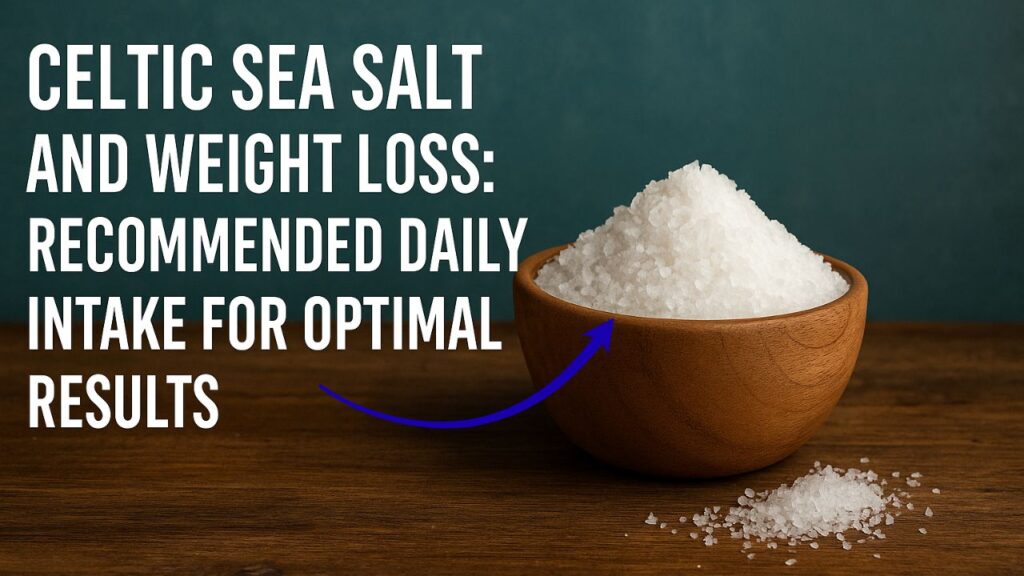In the realm of natural health and wellness, Celtic sea salt has garnered attention for its purported health benefits, including its potential role in weight loss. Unlike regular table salt, Celtic sea salt is harvested through traditional methods, retaining a rich profile of trace minerals. This article delves into the relationship between Celtic sea salt and weight loss, exploring its benefits, recommended daily intake, and how to incorporate it into your diet effectively.
What Is Celtic Sea Salt?
Celtic sea salt, often referred to as grey salt, is an unrefined sea salt harvested from the coastal regions of France, particularly the Guérande region. The harvesting process involves collecting sea water in clay ponds, allowing it to evaporate naturally under the sun and wind. This method preserves the salt’s natural minerals, giving it a distinctive grey hue and a moist texture.
Nutritional Profile
Celtic sea salt contains over 80 trace minerals, including:
- Magnesium
- Calcium
- Potassium
- Iron
- Zinc
These minerals are essential for various bodily functions, including nerve transmission, muscle contraction, and maintaining fluid balance.
How Celtic Sea Salt May Aid in Weight Loss
While no single food or supplement can guarantee weight loss, incorporating Celtic sea salt into a balanced diet may offer several benefits that support weight management:
1. Enhanced Hydration
Adequate hydration is crucial for weight loss. Celtic sea salt can help maintain electrolyte balance, which is vital for proper hydration. The minerals in Celtic sea salt, particularly magnesium and potassium, support fluid balance in the body, ensuring that cells function optimally.
2. Improved Digestion
The trace minerals in Celtic sea salt can stimulate the production of digestive enzymes, aiding in the breakdown and absorption of nutrients. Efficient digestion ensures that the body receives the necessary nutrients without accumulating excess waste, which can contribute to weight gain.
3. Balanced Blood Sugar Levels
Some studies suggest that the magnesium content in Celtic sea salt may help regulate blood sugar levels. Stable blood sugar levels can reduce cravings and prevent overeating, supporting weight loss efforts.
4. Detoxification Support
Celtic sea salt may assist in detoxifying the body by promoting the elimination of toxins through sweat and urine. A cleaner system can function more efficiently, potentially aiding in weight management.
Recommended Daily Intake of Celtic Sea Salt
While Celtic sea salt offers potential health benefits, it’s essential to consume it in moderation to avoid excessive sodium intake.
General Guidelines
- For healthy adults: Limit sodium intake to no more than 2,300 milligrams per day, as recommended by health authorities. Since Celtic sea salt contains approximately 500 milligrams of sodium per quarter teaspoon, this equates to about 1 teaspoon of Celtic sea salt daily.
- For individuals with hypertension or other health concerns: It’s advisable to consult with a healthcare provider to determine an appropriate amount of Celtic sea salt to include in your diet.
Incorporation Tips
- Morning Routine: Start your day with a glass of warm water mixed with a pinch of Celtic sea salt. This can help kickstart metabolism and promote hydration.
- Cooking: Use Celtic sea salt to season foods in place of regular table salt, enhancing flavor while providing additional minerals.
- Hydration: Add a small amount of Celtic sea salt to your water bottle during workouts to replenish electrolytes lost through sweat.
Potential Risks and Considerations
While Celtic sea salt can be a beneficial addition to your diet, it’s essential to be aware of potential risks:
- Excess Sodium Intake: Overconsumption of sodium can lead to high blood pressure, kidney disease, and other health issues. It’s crucial to balance salt intake with other dietary components.
- Quality Variations: Not all Celtic sea salt products are created equal. Ensure you’re purchasing from reputable sources to avoid contaminants.
- Individual Health Conditions: Those with specific health conditions, such as kidney disease or heart problems, should consult with a healthcare provider before increasing salt intake.
Incorporating Celtic sea salt into your diet, when used appropriately and in moderation, may offer several health benefits that support weight management. Its rich mineral content can enhance hydration, improve digestion, regulate blood sugar levels, and assist in detoxification. However, it’s essential to consume it within the recommended daily intake to avoid potential health risks. As with any dietary change, consulting with a healthcare provider is advisable to ensure it aligns with your individual health needs.
Frequently Asked Questions
1. Can Celtic sea salt help with weight loss?
While Celtic sea salt may support weight loss by improving hydration and digestion, it should be used as part of a balanced diet and healthy lifestyle.
2. How much Celtic sea salt should I consume daily?
For healthy adults, consuming about 1 teaspoon (approximately 5 grams) of Celtic sea salt daily is generally considered safe. However, individual needs may vary.
3. Are there any risks associated with consuming Celtic sea salt?
Excessive intake of sodium can lead to health issues such as high blood pressure. It’s essential to consume Celtic sea salt in moderation and consult with a healthcare provider if you have underlying health conditions.



